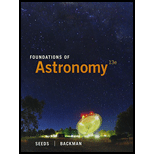
The orbital speeds at surfaces of Mercury, Venus, the Moon, and Mars.
Answer to Problem 11P
The orbital speeds at surfaces of Mercury, Venus, the Moon, and Mars are
Explanation of Solution
Write the relation for the orbital speed at the surface of planet.
Here,
In this case, the radius of the orbit is equal to the radius of the planet.
The mass of earth is
The orbital speed at the surface of Mercury:
Substitute
The orbital speed at the surface of Venus:
Substitute
The orbital speed at the surface of the Moon:
Substitute
The orbital speed at the surface of Mars:
Substitute
Conclusion:
Therefore, the orbital speeds at surfaces of Mercury, Venus, the Moon, and Mars are
Want to see more full solutions like this?
Chapter 5 Solutions
Foundations Of Astronomy, Loose-leaf Version
- Comet P/1999 R1 has a perihelion of 0.0570 AU and aphelion of 4.99 AU. Using the results of the previous problem, find its speed at aphelion. (Hint: The expression is for the perihelion. Use symmetry ot rewrite the expression for aphelion.)arrow_forwardLet gM represent the difference in the gravitational fields produced by the Moon at the points on the Earths surface nearest to and farthest from the Moon. Find the fraction gM/g, where g is the Earths gravitational field. (This difference is responsible for the occurrence of the lunar tides on the Earth.)arrow_forwardComet Halley (Fig. P11.21) approaches the Sun to within 0.570 AU, and its orbital period is 75.6 yr. (AU is the symbol for astronomical unit, where 1 AU = 1.50 1011 m is the mean EarthSun distance.) How far from the Sun will Halleys comet travel before it starts its return journey?arrow_forward
- Io, a satellite of Jupiter, has an orbital period of 1.77 days and an orbital radius of 4.22 105 km. From these data, determine the mass of Jupiter.arrow_forwardFind the mass of Jupiter based on the fact that I0 , its innermost moon, has an average orbital radius of 421,700 km and a period of 1.77 days.arrow_forwardWhat is the orbital period of a satellite orbiting just above the surface of the asteroid in Problem 11?arrow_forward
- It was stated that a satellite with negative total energy is in a bound orbit, whereas one with zero or positive total energy is in an unbounded orbit. Why zero or positive total energy is in an unbounded orbit. Why is this true? What choice for gravitational potential energy was made such that this is true?arrow_forwardCalculate the mass of the Sun based on data for average Earth’s orbit and compare the value obtained with the Sun’s commonly listed value of 1.9891030kg .arrow_forwardFollowing the technique used in Gravitation Near Earth’s Surface, find the value of g as a function of the radius r from the center of a spherical shell planet of constant density with inner and outer radii Rin and Rout . Find g for both eq and for RinrRout . Assuming the inside of the shell is kept airless, describe travel inside the spherical shell planet.arrow_forward
- Check Your Understanding The nearly circular orbit of Saturn has an average radius of about 9.5 AU and has a period of 30 years, whereas Uranus averages about 19 AU and has a period of 84 years. Is this consistent with our results for Halley’s comet?arrow_forwardAfter Cares was promoted to a dwarf planet, we now recognize the largest known asteroid to be Vesta, with a mass of 2.671020kg and a diameter ranging from 578 km to 458 km. Assuming that Vesta is spherical with radius 520 km, find the approximate escape velocity from its surface.arrow_forwardCalculate the values of g at Earth’s surface for the following changes in Earth’s properties: (a) its mass is doubled and its radius is halved; (b) its mass density is doubled and its radius is unchanged; (c) its mass density is halved and its mass is unchanged.arrow_forward
 Stars and GalaxiesPhysicsISBN:9781305120785Author:Michael A. Seeds, Dana BackmanPublisher:Cengage Learning
Stars and GalaxiesPhysicsISBN:9781305120785Author:Michael A. Seeds, Dana BackmanPublisher:Cengage Learning
 University Physics Volume 1PhysicsISBN:9781938168277Author:William Moebs, Samuel J. Ling, Jeff SannyPublisher:OpenStax - Rice University
University Physics Volume 1PhysicsISBN:9781938168277Author:William Moebs, Samuel J. Ling, Jeff SannyPublisher:OpenStax - Rice University Principles of Physics: A Calculus-Based TextPhysicsISBN:9781133104261Author:Raymond A. Serway, John W. JewettPublisher:Cengage Learning
Principles of Physics: A Calculus-Based TextPhysicsISBN:9781133104261Author:Raymond A. Serway, John W. JewettPublisher:Cengage Learning Glencoe Physics: Principles and Problems, Student...PhysicsISBN:9780078807213Author:Paul W. ZitzewitzPublisher:Glencoe/McGraw-Hill
Glencoe Physics: Principles and Problems, Student...PhysicsISBN:9780078807213Author:Paul W. ZitzewitzPublisher:Glencoe/McGraw-Hill Foundations of Astronomy (MindTap Course List)PhysicsISBN:9781337399920Author:Michael A. Seeds, Dana BackmanPublisher:Cengage Learning
Foundations of Astronomy (MindTap Course List)PhysicsISBN:9781337399920Author:Michael A. Seeds, Dana BackmanPublisher:Cengage Learning





